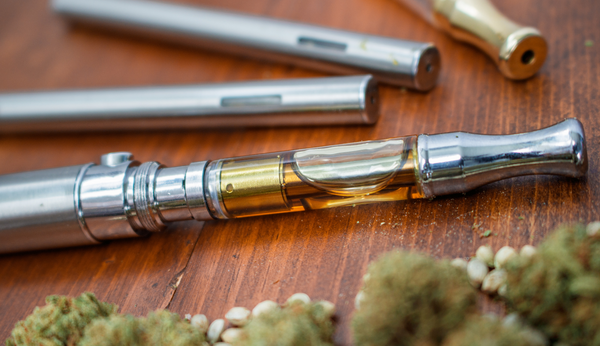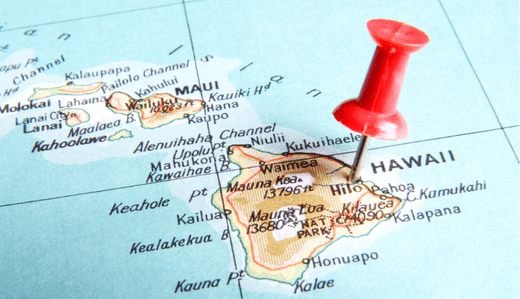Your Cart is Empty
FREE SHIPPING ON ALL ORDERS $75+
Hemp laws vary all over the country, and that includes laws concerning an up-and-coming cannabinoid, Delta-8-THC. Is Delta-8-THC legal in Hawaii? And if so, where can you find it?
Yes, technically Hawaii laws protect hemp material grown by a licensed grower, including all cannabinoids and tetrahydrocannabinols derived from hemp. Hawaii's Department of Health has issued a warning against Delta-8 and similar products, however, leaving it in a legal gray area.
Before you buy Delta-8 in Hawaii, here’s what you should know about Hawaii Delta-8 laws:
Looking for legal Delta-8-THC you can buy in Hawaii? Check out our Elev8 Collection.
Disclaimer: We’re always working to stay informed on the latest Delta-8 laws and research. However, state laws are subject to change and we advise that you do your own research to verify the information you find in this article. This is not intended as legal advice.
Delta 8 Hawaii Laws
Hawaii Delta-8-THC Laws
Is Delta-8 a Controlled Substance in Hawaii?
Delta-8-THC Possession Limits in Hawaii
Is Delta-9-THC Legal in Hawaii?
Where to Buy Delta-8 in Hawaii
Do You Have to Be 21 to Buy Delta-8?
Is Delta-8 Legal in All 50 States?
Resources
Hawaii has stricter CBD laws than most (especially compared to states like Illinois, New York, or Ohio where the hemp and Delta-8 market is virtually a free-for-all), but that doesn’t apply to hemp laws as a whole. The state of Hawaii has fully legalized hemp. With the passage of HB 2689, Hawaii officially defined hemp according to the federal definition.
The bill also serves to clarify a precise difference in “hemp” and “marijuana,” and amend state laws concerning “tetrahydrocannabinols” to exclude hemp derived cannabinoids. This effectively removed hemp derived cannabinoids from the state’s Controlled Substances Act.
Here are some snippets from the legal text:
(9) Amending definitions of “marijuana” in state law to clarify that hemp grown by a licensee is not marijuana and amending references to tetrahydrocannabinols in the state law to exclude tetrahydrocannabinols in hemp;
“Industrial hemp” means the plant Cannabis sativa L. and any part of that plant, including the seeds thereof and all derivatives, extracts, cannabinoids, isomers, acids, salts, and salts of isomers, whether growing or not, with a delta-9 tetrahydrocannabinol concentration of not more than 0.3 percent on a dry weight basis.
Section 329-1, Hawaii Revised Statutes, is amended as follows
“Hemp” means all parts of the plant Cannabis sativa L., whether growing or not, including the seeds thereof and all derivatives, extracts, cannabinoids, isomers, acids, salts, and salts of isomers, whether growing or not, with a delta-9 tetrahydrocannabinol concentration of not more than 0.3 percent on a dry weight basis, as measured post-decarboxylation or by other similarly reliable methods.
“Marijuana” means all parts of the plant (genus) Cannabis whether growing or not; the seeds thereof, the resin extracted from any part of the plant; and every compound, manufacture, salt, derivative, mixture, or preparation of the plant, its seeds, or resin. [It]
“Marijuana” does not include [the]:
(4) A product containing or derived from hemp, including any product containing one or more hemp-derived cannabinoids such as cannabidiol, that:
(A) Does not include any living hemp plants, viable seeds, leaf materials, or floral materials; and
(B) Has a delta-9 tetrahydrocannabinol concentration of not more than 0.3 per cent on a dry weight basis, as measured post-decarboxylation or by other similarly reliable methods.
Section 329-14, Hawaii Revised Statutes, is amended by amending subsection (g) to read as follows:
(g) Any of the following cannabinoids, their salts, isomers, and salts of isomers, unless specifically excepted, whenever the existence of these salts, isomers, and salts of isomers is possible within the specific chemical designation:
(1) Tetrahydrocannabinols; meaning tetrahydrocannabinols naturally contained in a plant of the genus Cannabis (cannabis plant), as well as synthetic equivalents of the substances contained in the plant, or in the resinous extractives of Cannabis, sp. or synthetic substances, derivatives, and their isomers with similar chemical structure and pharmacological activity to those substances contained in the plant, such as the following: Delta 1 cis or trans tetrahydrocannabinol, and their optical isomers; Delta 6 cis or trans tetrahydrocannabinol, and their optical isomers; and Delta 3,4 cis or trans-tetrahydrocannabinol, and its optical isomers (since nomenclature of these substances is not internationally standardized, compounds of these structures, regardless of numerical designation of atomic positions, are covered); provided that tetrahydrocannabinols under this subsection shall exclude tetrahydrocannabinols in hemp;

Hawaii updated state legislation to clarify that “tetrahydrocannabinols from hemp” are separated from other forms of tetrahydrocannabinols, like those found in marijuana.
They specifically added to the clause about tetrahydrocannabinols in the Controlled Substances Act the following phrase: “provided that tetrahydrocannabinols under this subsection shall exclude tetrahydrocannabinols in hemp.”
In other words, Delta-8-THC derived from hemp is specifically excepted from the state’s Controlled Substances list. Hemp-derived Delta-8-is not a controlled substance in Hawaii.
The state of Hawaii imposes no possession limits on hemp or hemp material, including Delta-8-THC.
Hawaii became the first U.S. state to legalize cannabis for medicinal use with the passage of Act 228 in 2000. Recreational cannabis is still illegal in the state, although possession of up to 3 grams has been decriminalized.
Delta-9-THC and marijuana are both considered Controlled Substances in the state of Hawaii. Larger amounts (up to one pound) may be punishable by misdemeanor, with fines ranging from $100-$2,000 and jail time of up to one year.

According to state hemp laws, legal hemp products can be sold in the state so long as it is produced by a licensed grower and in accordance with the state’s USDA hemp plan. That means you’re in luck if you’re looking to buy Delta-8-THC in Hawaii.
Still, it’s advisable to proceed with caution when choosing a Delta-8 distributor. While you can likely find various hemp products in local stores, there may be benefits to buying Delta-8 online.
One reason is that you can buy directly from a brand or manufacturer, instead of purchasing through a third-party vendor that may not fully understand Delta-8 effects and uses or the laws surrounding Delta-8 products.
At Vida Optima, our Delta-8-THC products comply with all parameters of the Hemp Farming Act of 2018. That means you can legally buy Delta-8 online from any area where Delta-8 is legal.
We can also help answer questions about Delta-8 before you buy, or you can read our “What is Delta-8-THC?” guide to learn everything you need to know.
There are no state regulations that place age restrictions on the purchase of hemp-derived products. Retailers have the right to determine age limits for the purchase of Delta-8 products, but many retailers require consumers to be at least 21 years of age.

Delta-8-THC is currently federally legal under the context of the Hemp Farming Act of 2018, but each state has the right to determine its own stance on tetrahydrocannabinols derived from hemp. Delta-8-THC is legal in Hawaii according to state law, but you should read more about Delta-8 laws by state to determine the legality in other areas.
Ready to shop for Delta-8 in Hawaii? Our Elev8 collection includes edibles, tinctures, vapes, and more that are Farm Bill compliant and legal in the U.S.
Yes, you can take Delta-8 THC to Hawaii as long as it complies with federal law, which requires Delta-8 products to contain less than 0.3% Delta-9 THC, as well as airline regulations.
Delta-8 THC is banned in several states, including Alaska, Colorado, Delaware, Idaho, Iowa, Montana, New York, North Dakota, Rhode Island, Utah, Vermont, and Washington.
Yes, you can bring CBD gummies to Hawaii as long as they contain less than 0.3% THC and comply with federal regulations and airline regulations.
Delta-9 THC is legal in Hawaii for medical use, and products containing Delta-9 THC must comply with state regulations regarding medical marijuana.
Yes, sales of Delta-8 THC continue in Hawaii amid murky legal status and lack of clear enforcement.
The legal status of Delta-8 THC in Hawaii is currently ambiguous, and it remains in a gray area, leading to ongoing sales despite potential legal challenges.
Comments will be approved before showing up.



